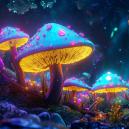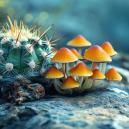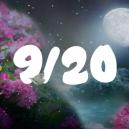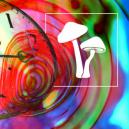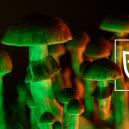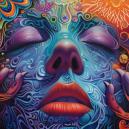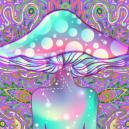Magic Mushrooms And Depression: What Is The Link?
Published : January 1st, 2021

"Magic" psilocybin-containing mushrooms are currently being studied for their therapeutic potential for a host of mental health conditions. Regarding treatment-resistant depression, psilocybin is of particular interest, and is now displaying some very promising results.
Once viewed as dangerous and shrouded in mystery, magic mushrooms are now being decriminalised in several American cities and explored by scientific researchers for their therapeutic potential. Although still categorised as a Schedule I drug (or equivalent) in most countries, governing bodies have started to grant legal access to researchers, and the Centre for Psychedelic Research at Imperial College London has been given the go-ahead to investigate them.
The “magic” in these mushrooms is derived from a psychotropic prodrug molecule known as psilocybin. This molecule acts on serotonin receptors in the brain, and in doing so can cause altered sensory experiences such as synaesthesia. Small doses of the psilocybin-containing fungi can result in elevated mood and emotional experiences, whereas large doses are associated with full-blown psychedelic states.
Researchers investigating psilocybin have encountered some interesting effects that suggest therapeutic use in conditions such as addictive behaviour, psychological distress, obsessive-compulsive disorder (OCD), and cluster headaches. Psilocybin has also been explored for its effects on depression, and has displayed some interesting and promising results herein.
WHAT EXACTLY IS DEPRESSION?

Depression is a common mental disorder defined by feelings of severe despondency and dejection. As opposed to temporary feelings of sadness or unhappiness that accompany certain life events, depression is a persistent and chronic state of deep sadness that has no single cause.
According to a World Health Organisation report, depression is reaching epidemic proportions worldwide, affecting more than 300 million individuals of all ages, with the disorder manifesting more frequently in women than men. Depression is now recognised as the leading cause of disability across the world. In some people, depression causes feelings and sensations that can lead to reclusive behaviour and inactivity, yet in others, symptoms can become so severe that they lead to suicidal behaviour.
SYMPTOMS OF DEPRESSION

The symptoms of depression can vary from person to person, as the condition affects individuals differently.
Common symptoms include:
- Anxiety and agitation
- Changes in appetite and bodyweight
- Anger and frustration
- Persistent feelings of sadness, emptiness, and tearfulness
- Issues with thinking, concentrating, and cognitive tasks
- Unexplained back pain and headaches
- Suicidal thoughts and behaviour
- Loss of interest in activities, hobbies, and work
- Reduced libido
- Feelings of worthlessness and guilt
- Personality changes
WHAT CAUSES DEPRESSION?
There is no single determining cause of depression. The disorder can arise due to certain triggers, including life-changing events such as the loss of a loved one, giving birth, or being fired from a job. Genetics can also play a role in the development of depression, and having a relative with the disorder is recognised as a risk factor.
Biological differences in brain structure are also associated with depression, with findings indicating physical changes in the brains of depressed individuals. Alterations in nerve cell connections, nerve cell growth, and nerve circuit function could all contribute to depression.
NEUROTRANSMITTERS, THE BRAIN, AND DEPRESSION
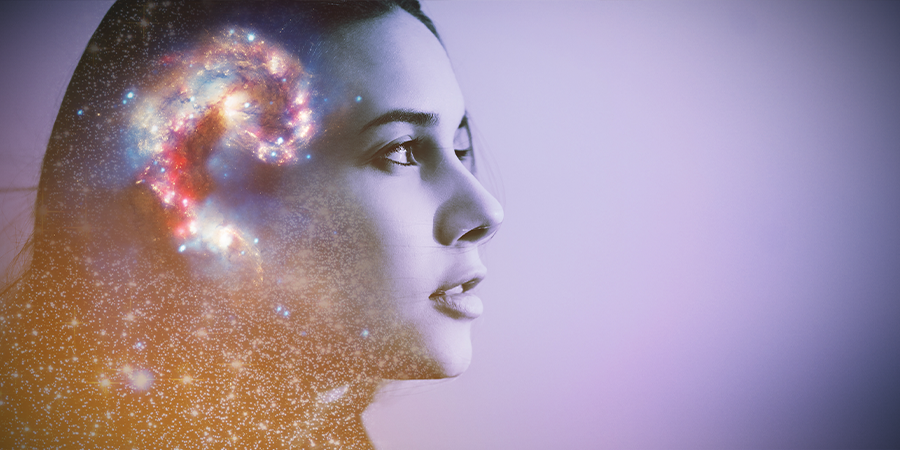
Neurotransmitters are chemical messengers released by neurons to transmit signals across synaptic spaces. Research shows a relationship between neurotransmitters dopamine, norepinephrine, and serotonin and symptoms of depression. Symptoms are associated with increases and decreases in the levels of these neurochemicals.
For example, low levels of serotonin have been linked to depression. Serotonin is involved in regulation of mood, social behaviour, appetite, sleep, and memory. This has led to the prescription of selective serotonin reuptake inhibitors (SSRIs) to block serotonin from being reabsorbed into neurons.
CONVENTIONAL TREATMENTS FOR DEPRESSION
Treatment for depression varies depending on the severity of symptoms. Mild depression may respond to lifestyle changes such as increasing levels of aerobic exercise. This can increase concentrations of neurotransmitters like dopamine and endocannabinoids like anandamide, which are both associated with increased mood.
In cases of mild to moderate depression, psychotherapy, cognitive behavioural therapy, and counselling may be provided to help individuals identify the root cause of associated behaviours, actions, and thought patterns.
Treatment for moderate to severe depression includes cognitive behaviour therapy, interpersonal therapy, psychodynamic therapy, and the prescription of antidepressant medications such as SSRIs, serotonin-norepinephrine reuptake inhibitors (SNRIs), atypical antidepressants, and monoamine oxidase inhibitors (MAOIs). These medications can be effective in some people, however, they are associated with side effects such as anxiety, dizziness, flu-like symptoms, and gastrointestinal irritation.
Below is a collection of scientific literature that reviews the effects of psilocybin on depression, possibly suggesting the future therapeutic use of the substance following further investigation and clinical trials.
Disclaimer: The following is not advice or an endorsement of magic mushroom use for as a treatment. Research is still very early and requires investigation on a much larger scale.
PSILOCYBIN MAY ASSIST TREATMENT-RESISTANT DEPRESSION
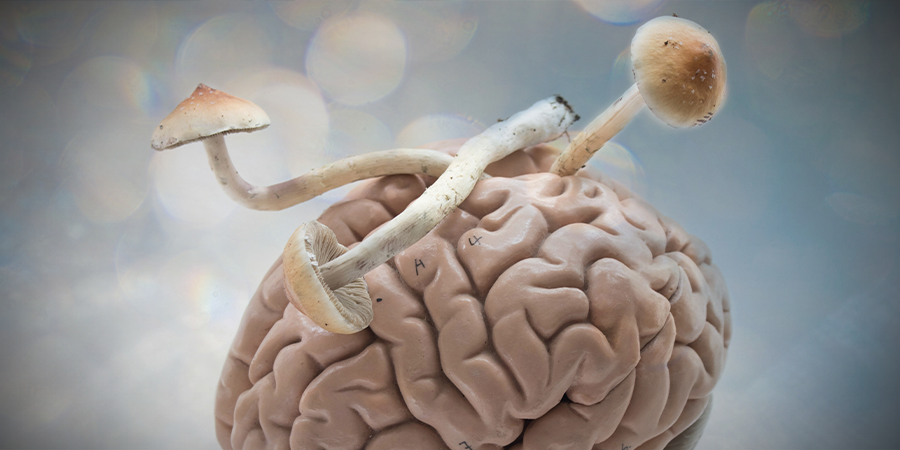
A paper published in the journal Scientific Reports documents a study in which 19 patients diagnosed with treatment-resistant major depression were administered psilocybin. Participants received pre-treatment and one-day post-treatment functional magnetic resonance imaging (fMRI) scans to determine the effects of the molecule on brain activity.
The authors of the paper state that psilocybin has an ancient and recent history of medicinal use. The molecule can produce emotional breakthroughs and altered perspectives when administered in a supportive environment augmented by integrative measures.
The aim of the study was to analyse changes in brain activity associated with the ingestion of psilocybin. Subjects were given a 10mg dose, followed by a 25mg dose one week later. Cerebral blood flow (CBF) and functional connectivity were measured one day before and one day after the treatment period. The researchers chose to prolong the final measurement to one day after treatment in order to measure the mood-enhancing effects of the so-called “afterglow”, a positive psychological state that follows the use of psychedelics.
The results showed that administration of psilocybin produced a rapid and sustained antidepressant effect, with all 19 patients exhibiting some reduction in depressive symptoms at 1 week. Changes in both resting-state brain blood flow and functional connectivity were identified. Decreased brain blood flow to the amygdala was observed, which correlated to a decrease in depressive symptoms. Interestingly, the amygdala is a region of the brain associated with emotions, survival instincts, fear, anxiety, and memory.
Other findings included increased ventromedial prefrontal cortex resting-state functional connectivity and decreased resting-state functional connectivity in the parahippocampal-prefrontal cortex 5 weeks after treatment. The researchers state that these lasting changes suggest a “reset” therapeutic mechanism, although further research using larger sample sizes and control groups is required.
FURTHER EVIDENCE FOR TREATMENT-RESISTANT DEPRESSION
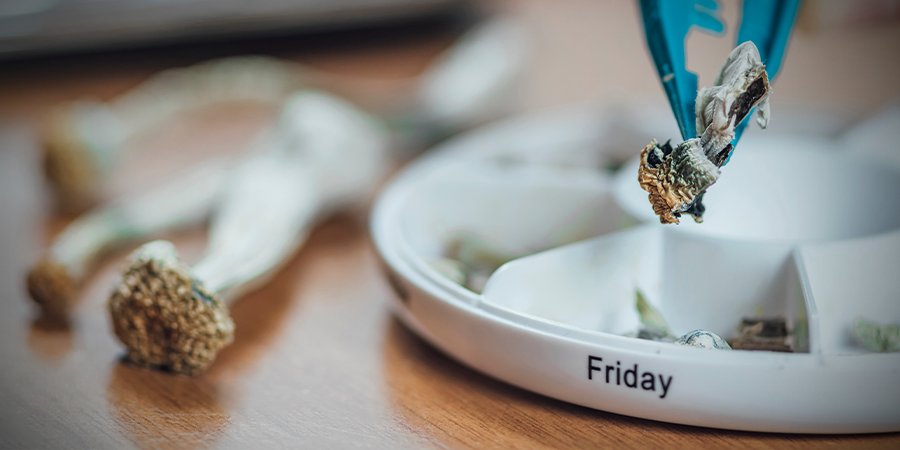
Additional research published in The Lancet Psychiatry also presents evidence that psilocybin may be an effective drug for treatment-resistant depression. The paper discusses the action of psilocybin as a serotonin receptor agonist, and aimed to investigate the efficacy and safety of the molecule in patients with unipolar treatment-resistant depression.
12 patients with moderate to severe treatment-resistant depression were administered a 10mg dose of psilocybin, followed by a 25mg dose 7 days later. The substance was given in a supportive environment along with psychological support provided before, during, and after the sessions. No serious side effects were observed, but minor adverse events such as transient confusion and anxiety were reported. It was found that depressive symptoms were still reduced 1 week and 3 months after the high dose session.
PSILOCYBIN SHOWN TO REDUCE DEPRESSION AND ANXIETY IN CANCER PATIENTS
Another clue to suggest psilocybin’s effects against depression can be found in research published in the Journal of Psychopharmacology. Cancer patients often develop depression and anxiety disorders because of the psychological stress associated with the condition, resulting in decreased quality of life. The researchers involved in this study wanted to investigate the effects of psilocybin on the psychological status of patients with life-threatening cancer.
51 patients were given a placebo-like dose of 3mg/70kg or a high dose of 22 or 30mg/70kg. Doses were administered in a counterbalanced sequence with 5 weeks between each session, and a 6-month follow-up check was conducted to keep track of effects. Results were obtained via clinician-rated and self-rated patient measures. High doses of psilocybin were found to produce large decreases in depressed mood, anxiety, and death anxiety, and increases in quality of life, life meaning, and optimism.
During the 6-month follow-up, it was found that these positive effects continued. A total of 80% of patients involved in the study displayed significant decreases in depression and anxiety.
CAN PSILOCYBIN WORK WHERE OTHER TREATMENTS HAVE FAILED?

Treatment-resistant depression is a tricky beast to tame. Depression usually responds well to psychotherapy, medication, or a combination of the two. However, sometimes the condition can be notoriously persistent, and these treatments do little to nothing to relieve the symptoms. This frankly brutal form of depression can leave individuals feeling hopeless and massively discouraged. Psychiatry and psychotherapy are utilised in treatment-resistant depression in hopes that they will eventually make an impact. Additional medicines may also be used to work as adjuncts to current prescriptions.
It’s quite clear from the research above that psilocybin needs greater investigation. It is clear that these small scale, highly controlled studies do not suggest that magic mushrooms are some kind of cure. Mushrooms are very reliant on setting and context to guide their effects, so much larger and much more detailed research is required to truly see what kind of effect they have.
DOES IT MATTER WHICH TYPE OF MAGIC MUSHROOM IS USED?
The type of mushroom consumed only matters if you are trying to ingest a particular dosage. Some varieties of psilocybin mushrooms contain extremely high doses of the active constituents, whereas others are moderate or mild. Researchers will often isolate the active compounds of mushrooms to have much more control over what is administered—another way this research differs from real life application.
MAGIC MUSHROOMS PROVIDE A GLIMMER OF HOPE FOR THE FUTURE OF DEPRESSION TREATMENT
Magic mushrooms may seem like one of the most unlikely places to seek a potential treatment for depression. Publicly vilified for decades, many people have the impression that these fungi are a threat to society. However, this is far from the truth. Current research displays massive promise for these mushrooms to be used as therapeutics for mental health disorders. As both decriminalisation and scientific research continues to mount, the coming years will surely bear some interesting results.







